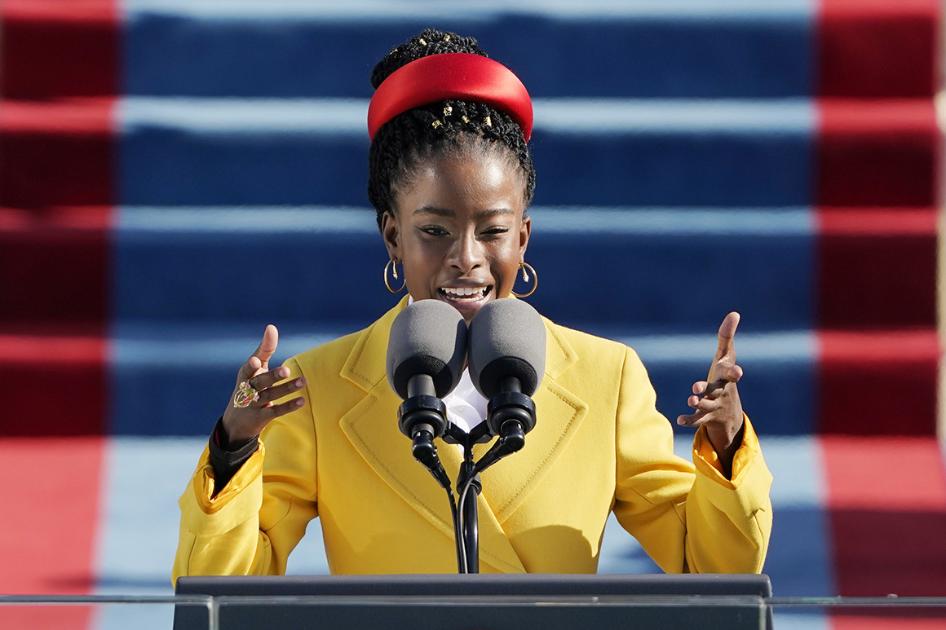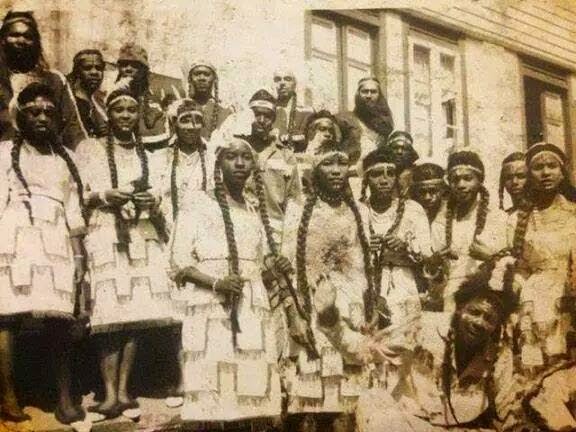Black Unity
A Movement Of Unification
Black Unity is a movement of unification of b lack people coming together as a Black Nation with one common cause, to unit with the common goal to achieve independence and emancipation within America as part of a reparation program. The main objective and mission of the Black Unity movement is to form a united Black Nation with its own government and political leaders and diplomats, military, economy, schools, hospitals etc..

Mr. President, Dr. Biden, Madam Vice President, Mr. Emhoff, Americans and the world, when day comes we ask ourselves where can we find light in this never-ending shade? The loss we carry a sea we must wade. We’ve braved the belly of the beast. We’ve learned that quiet isn’t always peace. In the norms and notions of what just is isn’t always justice. And yet, the dawn is ours before we knew it. Somehow we do it. Somehow we’ve weathered and witnessed a nation that isn’t broken, but simply unfinished. We, the successors of a country and a time where a skinny black girl descended from slaves and raised by a single mother can dream of becoming president only to find herself reciting for one. And yes, we are far from polished, far from pristine, but that doesn’t mean we are striving to form a union that is perfect. We are striving to forge our union with purpose. To compose a country committed to all cultures, colors, characters, and conditions of man. And so we lift our gazes not to what stands between us, but what stands before us. We close the divide because we know to put our future first, we must first put our differences aside.We lay down our arms so we can reach out our arms to one another. We seek harm to none and harmony for all. Let the globe, if nothing else, say this is true. That even as we grieved, we grew. That even as we hurt, we hoped. That even as we tired, we tried that will forever be tied together, victorious. Not because we will never again know defeat, but because we will never again sow division. Scripture tells us to envision that everyone shall sit under their own vine and fig tree and no one shall make them afraid. If we’re to live up to her own time, then victory won’t lie in the blade, but in all the bridges we’ve made. That is the promise to glade, the hill we climb if only we dare. It’s because being American is more than a pride we inherit. It’s the past we step into and how we repair it. We’ve seen a forest that would shatter our nation rather than share it. Would destroy our country if it meant delaying democracy. And this effort very nearly succeeded. But while democracy can be periodically delayed, it can never be permanently defeated. In this truth, in this faith we trust for while we have our eyes on the future, history has its eyes on us. This is the era of just redemption. We feared it at its inception. We did not feel prepared to be the heirs of such a terrifying hour, but within it, we found the power to author a new chapter, to offer hope and laughter to ourselves so while once we asked, how could we possibly prevail over catastrophe? Now we assert, how could catastrophe possibly prevail over us? We will not march back to what was, but move to what shall be a country that is bruised, but whole, benevolent, but bold, fierce, and free. We will not be turned around or interrupted by intimidation because we know our inaction and inertia will be the inheritance of the next generation. Our blunders become their burdens. But one thing is certain, if we merge mercy with might and might with right, then love becomes our legacy and change our children’s birthright. So let us leave behind a country better than one we were left with. Every breath from my bronze-pounded chest we will raise this wounded world into a wondrous one. We will rise from the gold-limbed hills of the West. We will rise from the wind-swept Northeast where our forefathers first realized revolution. We will rise from the Lake Rim cities of the Midwestern states. We will rise from the sun-baked South. We will rebuild, reconcile and recover in every known nook of our nation, in every corner called our country our people diverse and beautiful will emerge battered and beautiful. When day comes, we step out of the shade aflame and unafraid. The new dawn blooms as we free it. For there is always light. If only we’re brave enough to see it. If only we’re brave enough to be it.
We the People, in Order to form a more perfectu Union, establish Justice, insure domestic Tranquility, provide for the common defence, promote the general Welfare, and secure the Blessings of Liberty to ourselves and our Posterity, do ordain and establish this Constitution. When in the Course of human events, it becomes necessary for one people to dissolve the political bands which have connected them with another, and to assume among the powers of the earth, the separate and equal station to which the Laws of Nature and of Nature's God entitle them, a decent respect to the opinions of mankind requires that they should declare the causes which impel them to the separation.
We hold these truths to be self-evident, that all men are created equal, that they are endowed by their Creator with certain unalienable Rights, that among these are Life, Liberty and the pursuit of Happiness.--That to secure these rights, Governments are instituted among Men, deriving their just powers from the consent of the governed, --That whenever any Form of Government becomes destructive of these ends, it is the Right of the People to alter or to abolish it, and to institute new Government, laying its foundation on such principles and organizing its powers in such form, as to them shall seem most likely to effect their Safety and Happiness.
Divine Law and Nature's Law are relative and Supreme. The Common Laws that govern Civilization are derived from a study of these laws. Most of the important documents of the World, Treaties, Agreements and legitimate Contracts and Covenants are written in the Spirit of Divine Law for the purpose of governing the mental. . . Click on any Numbered Items on this page, Read, Print or Download, for your review. . Contents: Click on your choice to access directly or peruse the page: American Constitution 1789 (90) •Treaty of Peace and Friendship 1787• Articles of Confederation 1781 •Declaration of Independence 1776 •Articles of Association 1774 •Ben Bannekar Letter to Jefferson 1791 •George Washington Letter to Sultan 1789 •Inter Caetera Divina 1493 •Willie Lynch Papers 1712 •Christian Black Codes1724 •About United Nations •Declaration of Human Rights 1948 •Declaration of Rights of Child 1959 . . . This Page contains Constitutions, Treaties, Agreements, Church Bullas, Contracts, and other important National and International Documents and Correspondences. Most were written in the Spirit of preserving principled government, with emphasis on the protection of Substantive Rights, Birthrights, and basic Human Rights and Principles for All. However, many dishonorable and disingenuous men have violated these Noble and Ancient Principles, which are also embodied within the Constitution for the United States of America. Many people mistakenly think these Rights Preservations do not apply to them! …. Says Who? The governed are still, and always have been, the source where delegated governmental authority is derived. The preservation and protection of the Peoples’ Rights are why government exists. If and when Government Officials fail to uphold and support the Constitution, upon which they have taken their Official Oaths to uphold and support, then they are in violation of law; have abandoned their fiduciary duties; have 'quit’ their jobs; and thereupon possess no lawful authority. All government officials, including local Policemen and Firemen in the Cities and Burroughs, must take an Official Oath on the Constitution. If the natural people and citizens lack knowledge, they will often fail to recognize when an “Ordinance” or “Statute”, passed by politicians, violates the “Supreme Law of the Land”. No Ordinances or Statutes, or Laws of any of the several States, can contradict or violate the Supreme Law of The Land (See Article VI) and be held as constitutional. Physical, mental and spiritual oppression has taken such a negating toll on the misinformed and miseducated masses, that many have become apathetic, and appear not to care – showing a lack of interest in their own welfare or that of their progeny. . A misinformed, and miseducated people are limited in knowledge to protect their Substantive Rights. Naivety subjects them, and their children, to multiple abuses against their Rights. They can, and sometimes do, complain. More often then not, they get involved with self-serving associations that rarely produce solutions. If one does not know the nature or cause of their condition or problem, one is not likely to find or effectuate solutions. Many others, who remain civically inactive, are even more unlikely and unable to solve their social and political problems. They often remain stagnated, while waiting for someone else to 'fix' their condition. Consequently, this passive ‘state of mind’ deems it almost impossible for them to protect or defend themselves from ‘colorable’ acts of ‘colorable - government’. Knowledge redeems, and improves the capacity of any active natural person or citizen to better serve man and mankind. Enforcing the Constitution is a civic duty, responsibility, and progressive action. Supporting principles of Justice is the duty of all civilized People. This lends encouragement and support to a civilized world. . Did you know that the first Constitution was The 'Articles of Association' (1774); the second was the 'Articles of Confederation (1781-1788); the third was 'The Declaration of Independence (1776); and the fourth, is the present 'United States Constitution', adopted (1789)? . Article VI of the United States Constitution demonstrates the connectivity and Unity in Law of all the foregoing Constitutions, Articles Of Associations, Articles of Confederation, Declaration Of Independence, Treaty Of Peace and Friendship and all Treaties made under the Authority of the Constitution, are the Supreme Law of the Land. Scholars, and the erudite of Jurisprudence recognize these documents of Law as being ONE Constitution. As for Moorish Americans, relate the Treaty of Peace and Friendship from this perspective. Article VI of the Constitution For The United States of North America: All debts contracted and engagements entered into, before the adoption of this Constitution, shall be as valid against the United States under this Constitution, as under the Confederation. . This Constitution, and the laws of the United States which shall be made in pursuance thereof; and all treaties made, or which shall be made, under the authority of the United States, shall be the supreme law of the land; and the judges in every state shall be bound thereby, anything in the Constitution or laws of any State to the contrary notwithstanding. . The Senators and Representatives before mentioned, and the members of the several state legislatures, and all executive and judicial officers, both of the United States and of the several states, shall be bound by oath or affirmation, to support this Constitution; but no religious test shall ever be required as a qualification to any office or public trust under the United States. . American Constitution For United States of America - North Continent (1789) . About The Treaty of Peace and Friendship – 1787 A.D. Between Morocco and The United States By Taj Tarik Bey When reading, studying and / or analyzing “The Treaty of Peace and Friendship Between the Moors and the United States of 1787 A.D.”, one must be cognizant of the history and truth involving the relationship between the two political entities. A sound and prudent knowledge of the history of Europe and its adoption of governmental principles from the Moors is crucial to any serious historian. The logical recognition of the ancient presence of the Asiatic Moabite / Moorish presence in the Americas, coupled with world history, will definitely clear up most misrepresentations as have been effected by the destructive hands of the “Re-constructors of American History” and the traditional condition of ignorance as caused by the Colonial book – burners and slave holders. See Article VI of The Constitution For The United States of America. . Treaty Of Peace & Friendship 1787 2A. Authentic Treaty of Peace and Friendship from Congressional Records . About The Articles Of Confederation 1781--1788 The Articles of Confederation are referred to in the Constitution in Article VI, as a treaty or agreement entered into before the adoption of this Constitution. Therefore, it can be stapled to the Constitution, as it was not overridden or eliminated. During this Constitution, it clearly noted that all men are created equal, and since that constitution (articles) were never changed, there is no need for the 14th and 15th amendment. . Articles Of Confederation 1781--1788 . About The Declaration Of Independence 1776 . The Declaration of Independence is one of the four Constitutions. The European was in fact in slavery and they were of 3/5ths of a man. They were treated with despotism and wanted to be considered as equal. Thus, this famous and important document of their unanimous declaration, led to the fairer treatment of them with humane principles. The purpose of these contemporary interfacings and writings involved bringing them into the Constitutional fold of government. Much of the unspoken and uncommunicated history of this period involves the systematic subversion of the union agreements between the Moors / Sovereigns and the European colonial companies / guilds. The Europeans used force of arms, the power of the pen, and their newly learned Masonic principles of government, and conjoined them with negative law, to overthrow the Moors. . This betrayal of trust led to the practiced Inquisition policies which have become the institutionalized "dead-culture", corrupted politics that marks the negative side of North America's colonial human rights abuses practices. These practices have been falsely mis-labeled as racism. The greater negative part of the dead-culture includes land thefts, birthrights thefts, color-of-law activities, and the systematic slaughtering of the Aboriginals / Indigenes. These Niceno-Constantinopolitan war-rituals, inclusive of mental warfar strategies are particularly apparent in acts and symbolisms during harvest celebration, which came to be known and celebrated as “Thanks Giving”. The labels, “negro”, “colored”, “black", etc., were coined to mis-classify the natural people and take them outside of the fundamental principles of Proper-Person status. . Declaration OF Independence 1776 About the Articles of Association . . The Articles of Association are what is referenced when saying the Constitution of 1774, which has not changed. Therefore is again, an agreement entered into prior to the Constitution. Upon reviewing it, you will see that these are 'rules of engagement for the European colonist, who were British subjects in America and were given some sort of comfort and exile in America, of which they mention America as being dominioned by the British and their ancient civil principles. In this document it says "to dispose the inhabitants to act with hostility against the free Protestant colonies. Moors did no want the colonist to be here and sabotaged some of the efforts for imports, particularly the British (Brutish) Moors, of which the slavic europeans were subjects or rather slaves of. Again further proof these are NOT the dominions of foreign Europeans and they CANNOT become Americans, by default. only by naturalization, and there exist no flag of their nation, as thi sis NOT their nation, they aare subjects with granted privileges, including land grants, but not the true possessors. As naturalized citizens, they possess NO POLITICAL AUTHORITY!! The people who were ALREADY here were not Colonist -- OBVIOUSLY!!! The Congress is mentioned and ALREADY existed, and the people who were here were not Indians, thus not members, and no need to be members, of the "Bureau of Indian Affairs". It is clear that the people DID NOT want the coloinist to be here, to have any privileges, so in a sense Moors suffered a karmic consequence. However, it is what it is and the karmic debt is OVER!!!!! Now Moors MUST be who they are and be free and accessible to their own ancient civil principles, of which ancient civil principles and prejudices are mentioned in the document and so is ancient limits. It all makes so much sense and proves a willingness to accept others in the land, with a limited authority and not at the expense of losing all connection with self. Unfortunately this is not honored by those who were granted privileges, they prefer to say they don't know who or what a Moor is. . . The Articles Of Association . About The Letter From Benjamin Bannekar (Chief Justice Ben Bey) To Thomas Jefferson 1791 The Letter to Thomas Jefferson from Chief Justice Benjamin Bannekar Bey, clarifies his participation in teaching government to the Colonist, in creating the Almanac that he gave as a gift to Thomas Jefferson, and his participation in designing the “White House” for the use of the Colonist as a connection to their motherland as defined in what a Colonist is. The European Colonist are not Americas, they are European Colonist who have managed through trickery, deceit, and murder to sit in the seats of power. These seats ought to be occupied by the true American; those who think they are negro, colored, blacks, etc., and who think their homeland is limited to Africa in the East, as we know it to be today. . Letter from Benjamin Banneker To Thomas Jefferson 1791 . About Letter From George Washington To The Sultan Of Morocco 1789 The letter to the Sultan of Morocco, from President George Washington is one of the favorites amongst the Documents of American History, as it clearly indicates the newly formed “United States of America”, under the first Masonic President, George Washington, was subordinate to and dwelling on the dominions of the Moroccan Empire. Anything other than that holds no standing, as to why George Washington would write a letter as such to the Sultan of Morocco. It indicates without contradiction that the Moors were in the superior position, that George Washington was the newly appointed President of the United States of America in the North American Continent, under the rule and Dominion of the Sultan of Morocco. . Letter From George Washington To Sultan Of Morocco (1789) . About "Inter Caetera Divina" The Church Bulla of 1493 A.D. . Divina is a “password” used by most European Colonist descendants, who have overthrown, settled, or occupied other lands or countries. Divina, in most instances, appears unthreatening to the unknowing ear, when Europeans find cause to refer to their ‘pseudo-religious doctrine’, which is politically and socially inculcated with terse policies and regulatory constructs. However, it must be noted and brought to the attention of all Aboriginal natural peoples, that “Divina” was, and is, used as a war-reference and control guide-point for “Colonial Inquisition Operations in North America”. The formal name of the Divina Doctrine of Christianity is, “Inter Caetera Divina”. Its origin is from Pope Alexander VI, one of many iconic social / political / religious representative Vicars dedicated to policies for world dominance. The Germanic form or word, Gott / Guth / Gud / God, was introduced to the world during the Middle Ages, which is the period of European history that divides Ancient and Modern times, being 500 A.D. to 1450 A.D. The naïve converts among the Aboriginals, who have naively accepted their teachings, are deceived by the propagated beliefs that the Christians were embracing ideas of a universal Creator, or Supreme Being, overflowing with teachings of filial and universal love, etc. Little did the ‘Conversios’ know that (in reality) Divina, (from the European Colonial-conquest mindset) is an institutionalized religious - war ‘sanction’ tool, justifying genocide, rape, theft, sadistic human oppression, land thefts, .... . With the advent of the Spanish Inquisition, (Inquisitio) the maxims of inflicting creative forms of human torture, drowning, burnings, skinning, mutilations, death, and other horrors, became as normal to ‘justified’ Christendom—supremacy culture as their penchant for highly stylized rituals of prayer. These same ‘self-righteous’, self-appointed merchants of godliness, are also the supreme masters of sadism. The Aboriginal, natural peoples of the planet have suffered more deaths, slavery, artificially-induced diseases, and other sadistic mistreatments, at the hands of these pseudo-religious propagandists, than by that of the most vile and deviant soldiers amongst the known military armies of the world. . Bull Inter Caetera Intent (1493) . About The Willie Lynch Letter 1712 The Willie Lynch Letter, which is psuenonymous with Roman Conquest Culture as adopted for Social / Political Interfacings and interchagnes with Aboriginal and Indigenous Peoples. Theory is the epitome of Roman / European Colonial psychic warfare methodologies. It encapsulates the social and political aim s of Christendom, in its economic, social and political relationships to the suppressed and branded’ descendants of the fallen Asiatic Moorish Empire; and sets the standards for the means and attitudes to be taken, artificially maintained and practiced by the dominant European Colonialists occupying the Americas—particularly North America. Many Sociologists and Social Engineers in North America, have referred to the Willie Lynch Letter adn its characeristics merely as a theory. However, a theory means a thought , a viewing or mental contemplation as distinguished from an actual action or doing. It must be determined by the reader or student of History and experience, wether or not what is mentioned in the Willie Lynch letter has manifested n North American servitude activities or not. If such activities and culture have manifested in slave culture in North America, then it cannot be a theory. . Willie Lynch Letter 1712 . About The Christian Black Codes of 1724 . The Christian Black Codes of 1724 are the resulting list of 54 Christian Protocols and Acts, written to augment and institutionalize the William Lynch Theories of ‘Suppression and Control Methodologies’. These socialization tools are generally referred to as, ‘The Black Codes’. . . Christian Black Codes Of 1724 . About The United Nations (UN) . The Aboriginal and Indigenous Natural Peoples (Moors) of North America (and of the world) have a vested interest in knowing about, learning about, and preserving their Unalienable Rights, Substantive Rights, and Birthrights. Particular emphasis must be put on the fact that European Colonist Demo-operations are constantly violating Constitution principles and International Law. Officers, Politicians and Policemen, etc., are repeatedly breaking the Laws of Nations, in order to effectuate their ‘Color-of-Law’ practices of stealing the Birthrights of the Natural Peoples of the Land – particularly those of the Moorish Americans (who have been ‘branded’ as, negroes, blacks, coloreds, West Indians, Latinos, etc.). . The United Nations (being the nation members, listed below - in agreed unity of law) deals with matters of Human Rights supports and violations, and issues such Proclamations of Law (concerning these issues) through, and from, the General Assembly. People from different nations may, from time to time, file violation claims or complaints, etc., by way of The World Court (an Organ of the United Nations). Therefore, it is incumbent upon active Moors (and all ‘true’ American Citizens) to be aware of the six (6) different Organs of the United Nations and of their general purposes and functions...... . Click here for full Article "About The United Nations" . About The Universal Declaration Of Human Rights 1948 . Whereas recognition of the inherent dignity and of the equal and inalienable rights of all members of the human family is the foundation of freedom, justice and peace in the world, Whereas disregard and contempt for human rights have resulted in barbarous acts which have outraged the conscience of mankind, and the advent of a world in which human beings shall enjoy freedom of speech and belief and freedom from fear and want has been proclaimed as the highest aspiration of the common people, Whereas it is essential, if man is not to be compelled to have recourse, as a last resort, to rebellion against tyranny and oppression, that human rights should be protected by the rule of law,... . Universal Declaration Of Human Rights 1948 . About The Declaration of Rights of Child - Preamble From The United Nations 1959 Whereas the peoples of the United Nations have, in the Charter, reaffirmed their faith in fundamental human rights and in the dignity and worth of the human person, and have determined to promote social progress and better standards of life in larger freedom, Whereas the United Nations has, in the Universal Declaration of Human Rights, proclaimed that everyone is entitled to all the rights and freedoms set forth therein, without distinction of any kind, such as race, colour, sex, language, religion, political or other opinion, national or social origin, property, birth or other status,.....
.

The Black World
The Black World is a Black Enterprise Incorporated to create financial dividends, Bonds, Stocks of B lack and Shares for the development and establishment of Black prosperity, Enterprises, Corporations, Bussiness's, Establishments and Governments in contribution to the development of a Black Nation.
The Universal Declaration of Human Rights
The Universal Declaration of Human Rights (UDHR) is a milestone document in the history of human rights. Drafted by representatives with different legal and cultural backgrounds from all regions of the world, the Declaration was proclaimed by the United Nations General Assembly in Paris on 10 December 1948 (General Assembly resolution 217 A) as a common standard of achievements for all peoples and all nations. It sets out, for the first time, fundamental human rights to be universally protected and it has been translated into over 500 languages.

Preamble
Whereas recognition of the inherent dignity and of the equal and inalienable rights of all members of the human family is the foundation of freedom, justice and peace in the world, Whereas disregard and contempt for human rights have resulted in barbarous acts which have outraged the conscience of mankind, and the advent of a world in which human beings shall enjoy freedom of speech and belief and freedom from fear and want has been proclaimed as the highest aspiration of the common people, Whereas it is essential, if man is not to be compelled to have recourse, as a last resort, to rebellion against tyranny and oppression, that human rights should be protected by the rule of law, Whereas it is essential to promote the development of friendly relations between nations, Whereas the peoples of the United Nations have in the Charter reaffirmed their faith in fundamental human rights, in the dignity and worth of the human person and in the equal rights of men and women and have determined to promote social progress and better standards of life in larger freedom, Whereas Member States have pledged themselves to achieve, in co-operation with the United Nations, the promotion of universal respect for and observance of human rights and fundamental freedoms, Whereas a common understanding of these rights and freedoms is of the greatest importance for the full realization of this pledge,
Now, Therefore THE GENERAL ASSEMBLY proclaims THIS UNIVERSAL DECLARATION OF HUMAN RIGHTS as a common standard of achievement for all peoples and all nations, to the end that every individual and every organ of society, keeping this Declaration constantly in mind, shall strive by teaching and education to promote respect for these rights and freedoms and by progressive measures, national and international, to secure their universal and effective recognition and observance, both among the peoples of Member States themselves and among the peoples of territories under their jurisdiction.




Article 1.
All human beings are born free and equal in dignity and rights. They are endowed with reason and conscience and should act towards one another in a spirit of brotherhood.
Article 2.
Everyone is entitled to all the rights and freedoms set forth in this Declaration, without distinction of any kind, such as race, colour, sex, language, religion, political or other opinion, national or social origin, property, birth or other status. Furthermore, no distinction shall be made on the basis of the political, jurisdictional or international status of the country or territory to which a person belongs, whether it be independent, trust, non-self-governing or under any other limitation of sovereignty.
Article 3.
Everyone has the right to life, liberty and security of person.
Article 4.
No one shall be held in slavery or servitude; slavery and the slave trade shall be prohibited in all their forms.
Article 5.
No one shall be subjected to torture or to cruel, inhuman or degrading treatment or punishment.
Article 6.
Everyone has the right to recognition everywhere as a person before the law.
Article 7.
All are equal before the law and are entitled without any discrimination to equal protection of the law. All are entitled to equal protection against any discrimination in violation of this Declaration and against any incitement to such discrimination.
Article 8.
Everyone has the right to an effective remedy by the competent national tribunals for acts violating the fundamental rights granted him by the constitution or by law.
Article 9.
No one shall be subjected to arbitrary arrest, detention or exile.
Article 10.
Everyone is entitled in full equality to a fair and public hearing by an independent and impartial tribunal, in the determination of his rights and obligations and of any criminal charge against him.
Article 11.
(1) Everyone charged with a penal offence has the right to be presumed innocent until proved guilty according to law in a public trial at which he has had all the guarantees necessary for his defence. (2) No one shall be held guilty of any penal offence on account of any act or omission which did not constitute a penal offence, under national or international law, at the time when it was committed. Nor shall a heavier penalty be imposed than the one that was applicable at the time the penal offence was committed.
Article 12.
No one shall be subjected to arbitrary interference with his privacy, family, home or correspondence, nor to attacks upon his honour and reputation. Everyone has the right to the protection of the law against such interference or attacks.
Article 13.
(1) Everyone has the right to freedom of movement and residence within the borders of each state. (2) Everyone has the right to leave any country, including his own, and to return to his country.
Article 14.
(1) Everyone has the right to seek and to enjoy in other countries asylum from persecution. (2) This right may not be invoked in the case of prosecutions genuinely arising from non-political crimes or from acts contrary to the purposes and principles of the United Nations.
Article 15.
(1) Everyone has the right to a nationality. (2) No one shall be arbitrarily deprived of his nationality nor denied the right to change his nationality.
Article 16.
(1) Men and women of full age, without any limitation due to race, nationality or religion, have the right to marry and to found a family. They are entitled to equal rights as to marriage, during marriage and at its dissolution. (2) Marriage shall be entered into only with the free and full consent of the intending spouses. (3) The family is the natural and fundamental group unit of society and is entitled to protection by society and the State.
Article 17.
(1) Everyone has the right to own property alone as well as in association with others. (2) No one shall be arbitrarily deprived of his property.
Article 18.
Everyone has the right to freedom of thought, conscience and religion; this right includes freedom to change his religion or belief, and freedom, either alone or in community with others and in public or private, to manifest his religion or belief in teaching, practice, worship and observance.
Article 19.
Everyone has the right to freedom of opinion and expression; this right includes freedom to hold opinions without interference and to seek, receive and impart information and ideas through any media and regardless of frontiers.
Article 20.
(1) Everyone has the right to freedom of peaceful assembly and association. (2) No one may be compelled to belong to an association.
Article 21.
(1) Everyone has the right to take part in the government of his country, directly or through freely chosen repre-sentatives. (2) Everyone has the right of equal access to public service in his country. (3) The will of the people shall be the basis of the authority of government; this will shall be expressed in periodic and genuine elections which shall be by universal and equal suffrage and shall be held by secret vote or by equivalent free voting procedures.
Article 22.
Everyone, as a member of society, has the right to social security and is entitled to realization, through national ef-fort and international co-operation and in accordance with the organization and resources of each State, of the eco-nomic, social and cultural rights indispensable for his dignity and the free development of his personality.
Article 23.
(1) Everyone has the right to work, to free choice of employment, to just and favorable conditions of work and to protection against unemployment. (2) Everyone, without any discrimination, has the right to equal pay for equal work. (3) Everyone who works has the right to just and favorable remuneration ensuring for himself and his family an existence worthy of human dignity, and supplemented, if necessary, by other means of social protection. (4) Everyone has the right to form and to join trade unions for the protection of his interests.
Article 24.
Everyone has the right to rest and leisure, including reasonable limitation of working hours and periodic holidays with pay.
Article 25.
(1) Everyone has the right to a standard of living adequate for the health and well-being of himself and of his family, including food, clothing, housing and medical care and necessary social services, and the right to security in the event of unemployment, sickness, disability, widowhood, old age or other lack of livelihood in circumstances beyond his control. (2) Motherhood and childhood are entitled to special care and assistance. All children, whether born in or out of wedlock, shall enjoy the same social protection.
Article 26.
(1) Everyone has the right to education. Education shall be free, at least in the elementary and fundamental stages. Elementary education shall be compulsory. Technical and professional education shall be made generally available and higher education shall be equally accessible to all on the basis of merit. (2) Education shall be directed to the full development of the human personality and to the strengthening of respect for human rights and fundamental freedoms. It shall promote understanding, tolerance and friendship among all nations, racial or religious groups, and shall further the activities of the United Nations for the maintenance of peace. (3) Parents have a prior right to choose the kind of education that shall be given to their children.
Article 27.
(1) Everyone has the right freely to participate in the cultural life of the community, to enjoy the arts and to share in scientific advancement and its benefits. (2) Everyone has the right to the protection of the moral and material interests resulting from any scientific, literary or artistic production of which he is the author.
Article 28.
Everyone is entitled to a social and international order in which the rights and freedoms set forth in this Declaration can be fully realized.
Article 29.
(1) Everyone has duties to the community in which alone the free and full development of his personality is possible. (2) In the exercise of his rights and freedoms, everyone shall be subject only to such limitations as are determined by law solely for the purpose of securing due recognition and respect for the rights and freedoms of others and of meeting the just requirements of morality, public order and the general welfare in a democratic society. (3) These rights and freedoms may in no case be exercised contrary to the purposes and principles of the United Nations.
Article 30.
Nothing in this Declaration may be interpreted as implying for any State, group or person any right to engage in any activity or to perform any act aimed at the destruction of any of the rights and freedoms set forth herein.
The International Court Of Justice
The International Court of Justice (abbreviated ICJ; commonly referred to as the World Court)[1] is the principal judicial organ of the United Nations (UN). It settles legal disputes between member states and gives advisory opinions to authorized UN organs and specialized agencies. It comprises a panel of 15 judges elected by the General Assembly and Security Council for nine-year terms. It is seated in the Peace Palace in The Hague, Netherlands.
The International Court of Justice (ICJ), a UN court that settles disputes between nations.
The International Criminal Court (ICC), a court that prosecutes individuals for crimes against humanity and similar atrocities
Not to be confused with the International Court of Justice (ICJ).
International Criminal Court. The current premises of the International Criminal Court in The Hague, Netherlands. The ICC moved into this building in December 2015 interational Criminal Court (ICC or ICCt)[2] is an intergovern-mental organization and international tribunal that sits in The Hague in the Netherlands. The ICC has the juris-diction to prosecute individuals for the international crimes of genocide, crimes against humanity, and war crimes. The ICC is intended to complement existing national judicial systems and it may therefore only exercise its juris-diction when certain conditions are met, such as when national courts are unwilling or unable to prosecute crimin-als or when the United Nations Security Council or individual states refer situations to the Court.
Crimes against humanity are certain acts that are deliberately committed as part of a widespread or systematic attack or individual attack directed against any civilian or an identifiable part of a civilian population. The first prosecution for crimes against humanity took place at the Nuremberg trials. Crimes against humanity have since been prosecuted by other international courts – such as the International Court of Justice and the International Criminal Tribunal for the former Yugoslavia and the International Criminal Court, as well as in domestic prose-cutions. The law of crimes against humanity has primarily developed through the evolution of customary inter-national law. Crimes against humanity are not codified in an international convention, although there is currently an international effort to establish such a treaty, led by the Crimes Against Humanity Initiative.
International Criminal Law
International criminal law is a body of public international law designed to prohibit certain categories of conduct commonly viewed as serious atrocities and to make perpetrators of such conduct criminally accountable for their perpetration. The core crimes under international law are genocide, war crimes, crimes against humanity, and the crime of aggression. This article also discusses crimes against international law, which may not be part of the body of international criminal law. "Classical" international law governs the relationships, rights, and responsibilities of states. Criminal law generally deals with prohibitions addressed to individuals, and penal sanctions for violation of those prohibition imposed by individual states. International criminal law comprises elements of both in that although its sources are those of international law, its consequences are penal sanctions imposed on individuals.
© Copyright BREAKING CHAINS MINISTRY